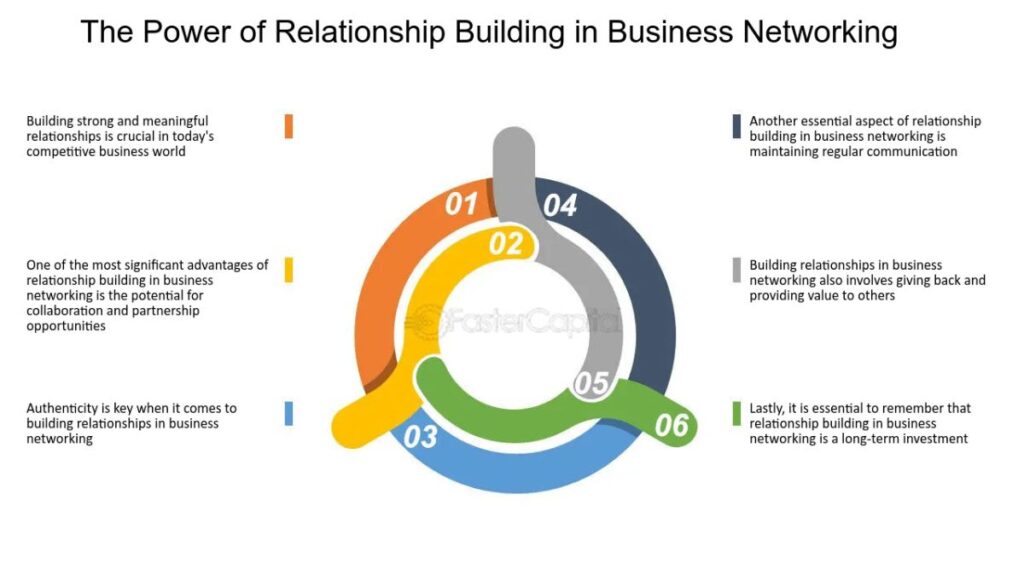In today’s fast-paced business environment, the importance of networking cannot be overstated. Networking is not just about exchanging business cards or connecting on social media; it’s about building relationships that foster growth and success. For entrepreneurs, small business owners, and corporate professionals alike, establishing a robust network is essential for unlocking new opportunities, gaining insights, and cultivating a community of support. This article delves into the significance of networking, exploring how building relationships can drive business growth and propel individuals and organizations toward their goals.
Understanding the Role of Networking in Business
At its core, networking is the act of creating and nurturing professional relationships. It involves connecting with individuals who can provide insights, opportunities, and resources that can benefit your business. In essence, networking serves as a catalyst for growth. Whether you are seeking to expand your customer base, find potential partners, or tap into new markets, a strong network can be a valuable asset.
Networking can take various forms, including industry conferences, networking events, online platforms like LinkedIn, and informal gatherings. Each of these venues provides unique opportunities to meet people, share knowledge, and explore potential collaborations. The key is to approach networking with a genuine intent to connect and contribute, rather than simply seeking what others can offer you.
The Benefits of Building Relationships
Building relationships through networking offers numerous advantages that can significantly impact your business. Some of the most notable benefits include:
1. Access to Opportunities
One of the primary benefits of networking is the access it provides to new opportunities. By cultivating relationships with industry peers, mentors, and potential clients, you create a channel through which you can discover job openings, partnerships, collaborations, and even investment opportunities. These connections can lead to referrals and introductions that may not have been possible without a strong network.
2. Knowledge Sharing
Networking is an excellent way to share knowledge and best practices. Engaging with others in your field allows you to learn from their experiences, gain insights into industry trends, and stay updated on new developments. This exchange of information can be invaluable, as it enables you to make informed decisions and stay competitive in your market.
3. Enhanced Reputation and Credibility
A robust network can enhance your reputation and credibility within your industry. By actively participating in networking events and contributing to discussions, you establish yourself as a knowledgeable and reliable professional. This can lead to increased visibility and recognition, making you a go-to resource for others seeking expertise in your area.
4. Support and Encouragement
Building relationships through networking creates a support system that can be incredibly beneficial for business owners and professionals. Having a network of peers and mentors can provide encouragement during challenging times, offer advice when faced with tough decisions, and celebrate your successes. This sense of community can foster resilience and motivation, ultimately contributing to your business growth.
5. Collaborative Opportunities
Networking often leads to collaborative opportunities that can drive innovation and growth. When professionals come together, they can brainstorm ideas, share resources, and work on projects that benefit all parties involved. Collaboration can lead to the development of new products, services, or solutions that may not have been possible in isolation.
Effective Networking Strategies
To leverage the benefits of networking effectively, it is essential to adopt strategies that foster meaningful connections. Here are some effective networking strategies to consider:
1. Be Genuine and Authentic
When networking, it’s crucial to be genuine and authentic in your interactions. People are more likely to connect with you if they feel you are sincere in your intentions. Take the time to get to know others, listen actively, and engage in meaningful conversations. Building trust is fundamental to establishing lasting relationships.
2. Attend Industry Events
Participating in industry events, conferences, and seminars is an excellent way to meet like-minded professionals. These events provide opportunities for networking and learning, allowing you to connect with individuals who share your interests and goals. Make it a point to attend these events regularly, as they can lead to valuable connections.
3. Utilize Online Platforms
In the digital age, online networking has become increasingly important. Platforms like LinkedIn, Twitter, and industry-specific forums offer opportunities to connect with professionals around the world. Share valuable content, engage in discussions, and reach out to individuals whose work resonates with you. Online networking can expand your reach and introduce you to potential collaborators and clients.
4. Follow Up and Stay in Touch
After meeting someone at a networking event or online, it’s essential to follow up and maintain the relationship. Send a personalized message thanking them for the conversation, and express your interest in staying connected. Regularly check in with your contacts, share relevant articles, or invite them to coffee. Consistent communication reinforces the relationship and keeps you top-of-mind.
5. Give Before You Get
Networking should be approached with a mindset of giving. Look for ways to help others in your network, whether through sharing resources, offering advice, or making introductions. By being generous with your knowledge and support, you create a positive impression and encourage reciprocity, ultimately strengthening your relationships.
Networking and the Digital Landscape
The rise of social media and digital communication has transformed the way we network. While traditional networking methods remain valuable, online networking offers unique advantages that can enhance your reach and connectivity. Here’s how to navigate networking in the digital landscape:
1. Leverage LinkedIn
LinkedIn is a powerful tool for professional networking. Create a compelling profile that showcases your skills and experiences, and actively engage with your connections by sharing content and commenting on their posts. Join industry-related groups to participate in discussions and connect with new professionals in your field.
2. Engage in Online Communities
Participate in online forums, groups, and communities related to your industry. Contributing valuable insights and engaging in discussions can help you establish authority and connect with others who share your interests. Look for opportunities to collaborate with members of these communities to foster relationships that can benefit your business.
3. Utilize Virtual Networking Events
As remote work becomes more common, virtual networking events have gained popularity. Attend webinars, online conferences, and networking meetups to connect with professionals without geographical limitations. These events often provide opportunities for breakout discussions and one-on-one networking, allowing for deeper connections.
Overcoming Networking Challenges
While networking offers immense benefits, it can also present challenges. Some individuals may feel intimidated by the prospect of networking, especially in large groups or unfamiliar environments. Here are some strategies for overcoming common networking challenges:
1. Practice Your Elevator Pitch
Having a well-prepared elevator pitch can help alleviate nerves when introducing yourself to new contacts. Craft a concise and engaging summary of who you are, what you do, and what you hope to achieve through networking. Practicing this pitch can boost your confidence and make a positive impression.
2. Set Realistic Goals
When attending networking events, set realistic goals for what you want to achieve. This could be as simple as connecting with three new people or engaging in meaningful conversations with a few industry leaders. Setting achievable goals can reduce anxiety and give you a sense of purpose during the event.
3. Embrace Rejection
Not every networking attempt will lead to a fruitful connection, and that’s okay. Embrace rejection as part of the process and recognize that not every interaction will yield immediate results. Focus on building relationships with those who resonate with you and remain open to new opportunities.
Measuring the Impact of Networking on Business Growth
To truly understand the value of networking, it’s essential to measure its impact on your business growth. Consider the following metrics to assess the effectiveness of your networking efforts:
1. Referral Sources
Track the number of referrals you receive from your network. Referrals can be a strong indicator of the quality of your connections and the value of your relationships. If you notice an increase in referrals, it’s a sign that your networking efforts are paying off.
2. New Opportunities
Monitor the number of new opportunities that arise as a result of networking. This could include partnerships, collaborations, or new clients gained through your connections. Keeping a record of these opportunities can help you quantify the benefits of your networking activities.
3. Engagement Levels
Evaluate the engagement levels of your network. Are your connections interacting with your content, attending your events, or referring you to others? High engagement indicates that your relationships are strong and that your network is invested in your success.
Conclusion
In conclusion, networking is a vital component of business growth. The relationships you build through networking can unlock opportunities, enhance your reputation, and provide valuable support and resources. By approaching networking with a genuine intent to connect, sharing knowledge, and actively engaging with your community, you can create a robust network that drives your success. As you continue to build and nurture these relationships, remember that networking is not just about what you can gain; it’s also about what you can contribute to the success of others. Embrace the power of networking, and watch as your business flourishes through the connections you cultivate.






